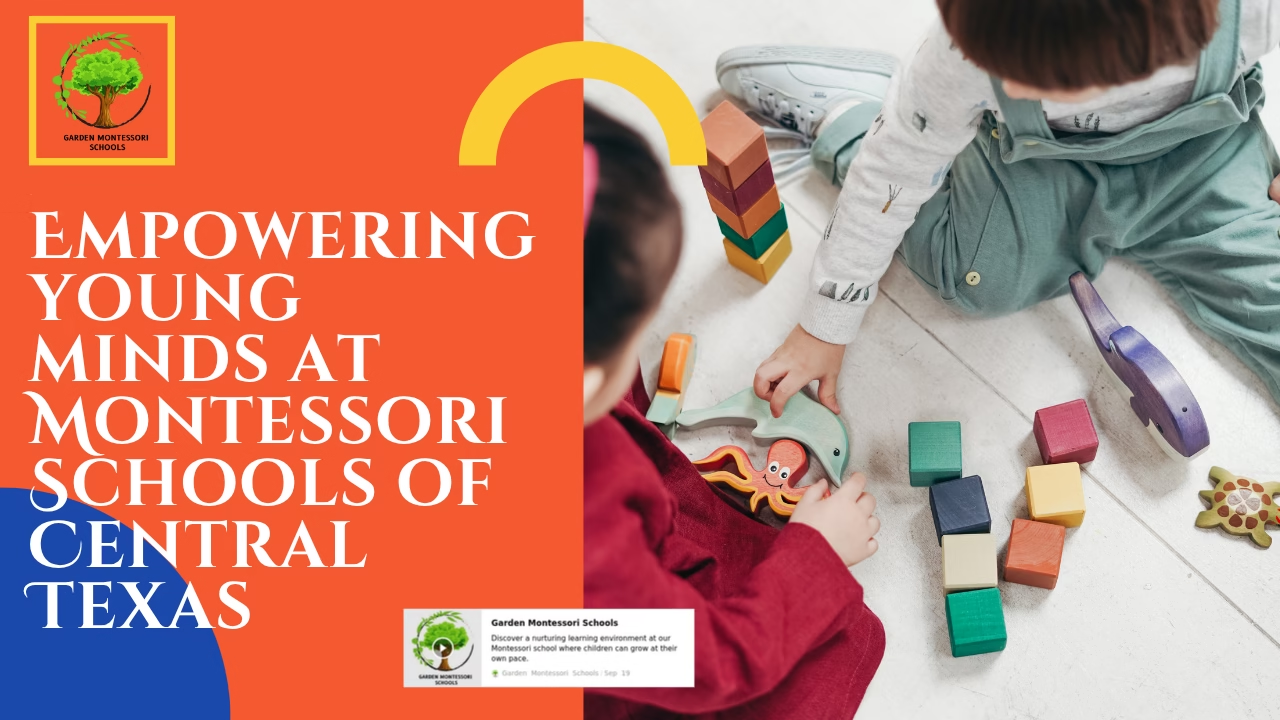They encourage children to learn through independent efforts which may involve exploration, solution-finding and collaboration which are often neglected by traditional forms of education. Children in the Montessori system respect everyone and everything, they take up responsibilities and have a good level of awareness which makes the system very suitable for children.
This blog will inform you about the benefits of Montessori school, be it its learning tailored to the needs of the child or its capacity to foster in them the abilities of critical thinking and social and emotional understanding.
Those who are parents and are considering a Montessori school for their children will find this blog very useful as they will know why Montessori education is the right approach for them.
Why is it said that children in Montessori schools would strive towards independence and development of self-confidence?
The education model developed by Maria Montessori is designed to promote the independence of children. It’s up to the students what they would like to concentrate on, and so this self-governing autonomy ensures that individuals learn and take on responsibilities.
Montessori places great importance on timekeeping, making choices and ensuring that they are acted on. This leads to students developing ownership in their learning as they feel satisfied with what they do and achieve. But this is just the beginning of what is possible.
Because Montessori classrooms are heterogeneous, older children become a source of leadership for younger children and take on more responsibilities. This benefits their self-esteem while fostering relationships and mentorship.
Independence and confidence building are the primary benefits of Montessori education, allowing children to grow to be confident individuals who are not afraid to take on challenges.
How is gender-related bias in the sense of learning alongside gender elitism at Montessori schools alleviated?
Hands-on active learning is an essential part of the Montessori learning technique. Children at Montessori schools do not learn passively; rather, they learn actively with the help of materials and activities that they come into contact with.
They learn through doing; interacting with and experimenting with objects while solving problems in real time. In the end, this approach equips children with knowledge that stays with them long-term.
This phenomenon is frequently linked with application-based learning techniques like project-based learning or problem-based learning.
Montessori learning spaces are outfitted with specific didactic materials that allow children to explore and learn through real-life experiences. For example, materials for maths and language are structured in such a way that they are self-correcting devices for children, allowing for the discovery of concepts.
Active learning not only makes education more fun but fosters critical thinking and problem-solving abilities which helps them in real life.
Why has there been a widespread belief that Montessori education works in favour of social and emotional development?
In the Montessori education setting, children tend to learn how to be respectful towards their peers as well as to adults. Such a setting encourages the students to work together by encouraging them to speak out, listen to others, and come up with solutions to challenges.
This, in turn, helps children to improve their communication skills, develop empathy and enhance higher order thinking.
Additionally, multi-age grouping in Montessori settings fosters social and emotional development. Younger children admire and want to be like the older ones, while older children take their role of mentoring younger children seriously.
It creates a home-like situation where children are bound to help each other. One of the advantages of such education is the inculcation of social and emotional development which helps children adapt to the changes in social cultures.
In what ways does the Montessori Education Curriculum enhance Critical Thinking and Effective problem-solving skills?
Critical and independent thought is instilled in a Montessori student from the very beginning of their learning journey. Exploration of ideas and solutions is a task that teachers assist students with; however, finding that answer on their own is solely up to the students themselves.
This philosophy teaches students how to partition and orient their minds to various problems in a different way than they are accustomed to doing.
The ability to think critically about the world is another gift that helps them explore the outside and its components.
Such students become the best candidates for academic success as they evolve into natural problem solvers, capable of thinking and addressing any issue on a more sophisticated cerebral level.
According to recent research, a strong emphasis placed on inquiry-based learning throughout Montessori frameworks promotes a growth mindset towards learning and problem-solving for any student, and not just academically.
How Does The Montessori Curriculum Foster Creativity and Innovation?
Creativity as a whole is nurtured at Montessori schools due to the nature of the curriculum encouraging such behaviour of free pondering and exploration into many things. Students are allowed to pursue subjects that intrigue them or seek to express their thoughts in the form of art, music, or literature.
The emphasis placed on self-directed learning goes hand in hand with creativity. When children are encouraged to pursue their own interests, there is a higher possibility of them coming up with new ideas and examining a situation in new ways.
Montessori education gives children this opportunity: it creates an environment infused with children’s endless potential, joy, imagination, and creative expression and helps them develop their inner self.
How do Montessori schools nurture excellence in children?
Although deficiency in educational accomplishment is not due to their over-focus on other things, Montessori education is not about apathy towards introverted academic achievement.
The Montessori system is, in fact, the more effective system over their conventional alternatives; we have implicit evidence of this fact, as a large number if not most artisans are brought up in the Montessori system when it comes to maths, reading, and writing.
This is possible since Montessori education emphasises the early childhood period, which is when such things should be prioritised.
Instead, Montessori teachers act as if they are guides, allowing children to master concepts on their own by giving them enough time.
This approach also helps students increase their confidence in their academic prowess while also deepening their understanding of various subjects, which in turn allows them to succeed academically in the long run.
What is the purpose of ever going to school in the first place?
The answer probably lies in our constitution that protects our right to education. However, the truth is far different from being that sweet.
Because at the end of the day, it all comes down to artificial instructions compelling you to elaborate on things many have started forgetting; the love for learning is lost. What we fail to acknowledge is that real life cannot be confined to subjects; rather, understanding life is the aim of being educated.
Imagine being able to take control of how and what you want to learn and in what way you want to apply your acquired knowledge. Real life doesn’t offer you that luxury. Children in the Montessori system are given the option to be self-centric and teach themselves.
They are required to juggle multiple tasks and find a solution that works best for them; naturally, they develop a curious mindset and a deep understanding. More importantly, this is how intrinsic motivation is formed.
Such a strong mindset ensures that no hurdles can come in the way of achieving the set goals, which is the very definition of success.
How should we talk about Montessori and all of its benefits without mentioning how it prepares students for the future?
Most children remain oblivious to the modernised world around them because they are stuck “picking apples from trees”, which is stereotypical for most curriculums. Montessori puts emphasis on being an independent thinker and developing creative social skills, which not only allows them to use life skills but also successfully compete for jobs in the modern workforce.
Montessori students gain crisis resolution, teamwork and change management skills, which today’s employers appreciate. Educators particularly stress the protection of the environment and the practice of global citizenship, enabling students to grasp the question of their place in the world.
Thus, students are well prepared for such achievements as scholarship opportunities and, more importantly, life with meaning.
Extensive Writing About Montessori Schools and Their Philosophy: How They Cater To Multiple Learning Styles?
The core tenet of Montessori education is the belief in the individuality of each child. The core of the Montessori method is the need to serve the different learning needs of a child so each one can acquire knowledge in the most effective way possible.
Montessori classrooms are rich in resources that allow for hands-on learning, regardless of whether the child is a visual, motor or auditory learner.
Teachers are attentive to students and modify their style for each child so that every child can benefit from a Montessori education, regardless of their capabilities.
How does one practice self-discipline and self-motivation in the context of Montessori education?
One encouraging aspect of Montessori education is the focus placed on children’s ability to take ownership of their learning. This promotes self-discipline, as students have to learn to control their time and finish their work on their own.
The arrangement of the classroom, as well as the way in which children are taught individually, makes it much easier for children to concentrate and be motivated.
Self-discipline is also strengthened through the principle of natural consequences. If a child opts not to finish a piece of measuring the distance between two networks, then they would personally suffer the consequences of this decision without any form of punishment.
This assists children in achieving internal motivation and understanding the significance of effort and perseverance.
Conclusion:
Montessori education has a lot of positive things to offer and to strive for. Since these schools encourage autonomy, handicraft, art, critical thinking, and emotional intelligence, the whole system is well-planned and makes sense.
Children who graduate from such schools possess all the competences that would prepare them to be successful in their studies, social life, and emotional sphere. This foundation, in all likelihood, would determine success in adult life.
If you wish to provide a Montessori education for your child, visit us at Garden Montessori Schools, as we focus on the entire growth of each child. Memorial Garden Montessori is a great place to look at for an innovative learning environment.
FAQs For Benefits Of Montessori School
What are the merits of Montessori education?
Children learn to be responsible, more innovative and creative, develop the ability to think critically and control their emotions. This in turn prepares them for educational pursuits at an early age as well as self-learning in the long run. Find out more at Garden Montessori Schools.
How do schools promote independence of their children through education and training?
Children decide how they want to approach a learning process in a Montessori maths curriculum. In this way, children learn independently and become more confident over time at Garden Montessori Schools.
Why do children develop strong social skills in the Montessori system of education?
Children are educated in an environment of their peers, and this encourages them to work together, respect each other and communicate, thus greatly developing their social and emotional skills at Garden Montessori Schools.
What happens to the children after undergoing the Montessori system of education, how are they different?
If children are taught to think, create, problem-solve and be flexible, they won’t have problems in the future. See more at Garden Montessori Schools.
Why do I consider Garden Montessori Schools to be the best for my child?
Garden Montessori Schools help children become self-reliant, creative, innovative and ultimately academic achievers, thus paving the way for their success in the near future.



